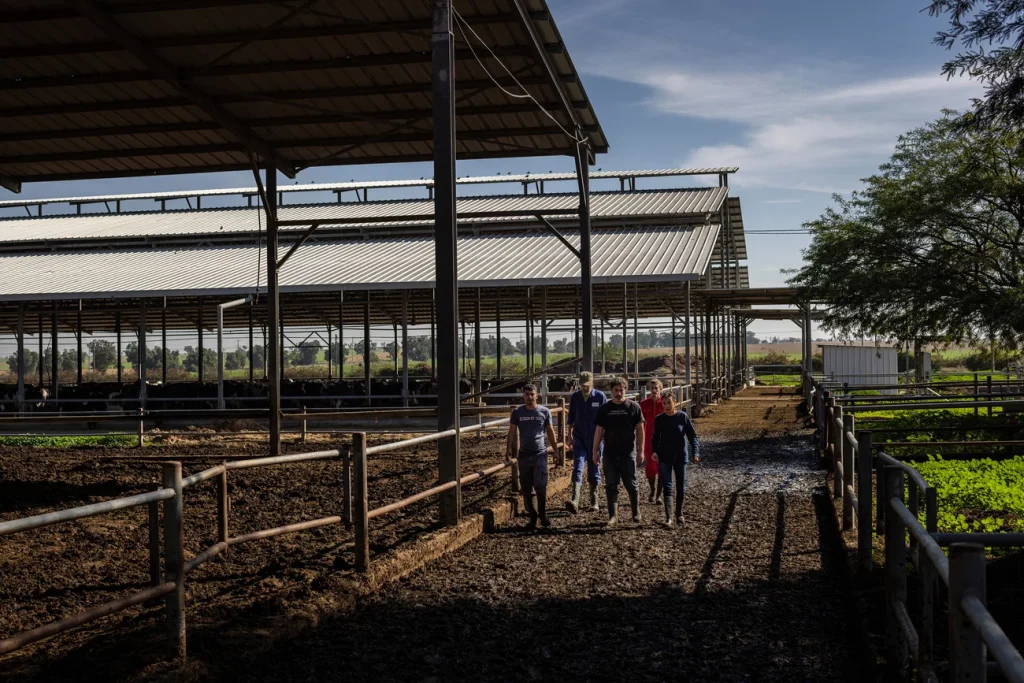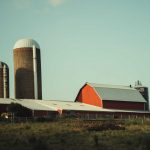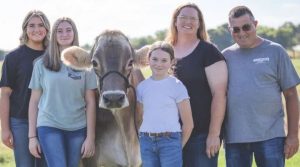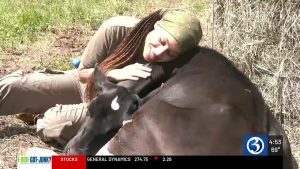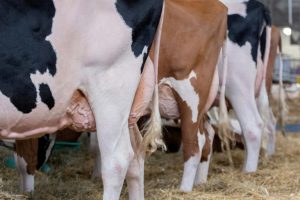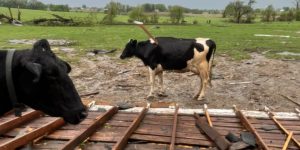
At a dairy farm a few miles from the Gaza border, hundreds of cows are being herded into milking stations as the sound of Israeli airstrikes reverberate through the morning air.
Since Hamas fighters swept through this area on Oct. 7, killing or kidnapping a total of 1,200 people, Israel says, the bombing has become commonplace — even more so since Khan Younis, Gaza’s second-largest city located nearly due west of here, has become a focus of the conflict.
The cattle aren’t spooked by the sounds of war. For the people here, however, the conflict is hard to ignore.

Volunteer Aline Stern sits on a tractor at a dairy farm near Nir Oz, one of the communities attacked on Oct. 7 by Hamas militants.
Tamir Kalifa for NPR
Aline Stern, a retired nurse from northern Israel who has been volunteering at the farm for the past few weeks, has learned to identify the implements of modern warfare. Looking up, she points out an Israeli drone flying directly overhead. Later, she notes the distinctive whoosh from a salvo of Hellfire missiles and explains that they are fired from Apache helicopters. Familiar as it all is, “you never get used to it,” she says.
Stern is one of about a dozen volunteers from Israel and around the world who have been rotating into this farm close to Nir Oz, a communal farm community in Israel known as a kibbutz. She’s helping fill the gap left by the workers who are no longer here.

Cows are moved to a milking parlor at a dairy farm near the border with Gaza.
Tamir Kalifa for NPR
Of the 400 residents of Nir Oz, Hebrew for “courageous meadow,” about 38 were killed by Hamas and another 75 seized as hostages, according to Israeli media. Along with the nearby Be’eri, it was among the hardest-hit kibbutzim. Some members of these communities have already said they have no intention of coming back.
After the October attack, it took Israeli troops five days to regain control of this area. In that time, Stern says, the cows that normally get a daily milking were left unattended. Many developed infections and more than 100 were too far gone by the time the army let anyone return. The animals had to be slaughtered.
The surviving cows, she says, “were very sad, they didn’t give milk like they used to.”
Eleven weeks since the start of the war, things on this side of the Gaza border are slowly getting better — although no one can yet imagine anything resembling normalcy.

Shmulik Itzhaki volunteers in the milking parlor. He says he’s happy to pitch in for as long as he can.
Tamir Kalifa for NPR
Shmulik Itzhaki is a volunteer from central Israel. His day job in satellite communications is seemingly the polar opposite of dairy farming. He says he’s happy to pitch in for as long as he can, but given the horrors the community experienced, he doesn’t think the survivors will ever call it home again.
“For the people who lived here, it’s a trauma,” Itzhaki explains. “Imagine someone who escaped from Auschwitz and you ask him to go live there? It’s hard.”
The decision to return
For many here, the decision to help comes from a sense of duty. Gabriel Leff, a 23-year-old from Cocoa Beach, Fla., certainly sees it that way. Moved to sympathy by the events of Oct. 7, he arrived in Israel two months ago and since then has been volunteering in various places around the country. He’s a fairly new arrival at the dairy farm.

Gabriel Leff mows grass at a dairy farm. He arrived in Israel after the Oct. 7 attacks and has been volunteering at various places around the country, including at the dairy farm.
Tamir Kalifa for NPR
Leff wears a kippah, the traditional Jewish head covering, and sports faded blue jeans, a sleeveless t-shirt and the tall work boots required for traipsing through cow manure.
“I’m young. I have the free time. I’m able bodied. And I felt interested in doing my part,” he says.
Leff sees Israel as a safe haven for Jews living in a troubled world. “Everywhere we seem to call home, at some point in time, we’ve been uprooted from,” he says. “When antisemitism rises, as it is currently, we always have somewhere to go. For the past 75 years, that’s been Israel.”

Nathaniel Willemse is a law student from the Netherlands and is volunteering at the dairy farm.
Tamir Kalifa for NPR
As the cows are herded in for milking, Nathaniel Willemse, 21, confidently taps their hind legs, coaxing each animal into position above milking stations. He is a law student from the Netherlands. He once worked on a dairy farm, so the work here is old hat for him.
Unlike Leff, Willemse isn’t Jewish. He just saw a need and decided to spend a few weeks in Israel before starting a new job back home. “I heard of the terrible things that happened. I just wanted to help a little bit,” he says.
“It will take time”

Smoke rising from Gaza is seen from a citrus and avocado farm near the border with Gaza in southern Israel on Wednesday.
Tamir Kalifa for NPR
Not far from the dairy farm, an all-too-close Israeli howitzer intermittently lobs artillery into Gaza. A sandy road splits neat rows of avocado and orange trees, pregnant with ripe fruit.
Paul Flynn came to Israel from Ireland four decades ago and still retains his native brogue. He’s a supervisor at the orchards that are collectively operated by seven villages of Israelis who were relocated from inside of Gaza in 2005, when Israel disengaged from the Palestinian territory to allow for self-government there.
Flynn says a large swath of the fields have now been declared off limits by the army. They’re simply too close to Gaza.
Before the war, he oversaw about 40 laborers from Thailand. The day Hamas attacked was a Saturday and Flynn was at home. The Thai farm hands, however, were working. As Hamas fighters overran the area, the workers made a panicked retreat to a safe room on the farm grounds. They spent the next day there before an Israeli tank arrived and was able to chase off the militants.
It was a harrowing experience, and afterward, all but a handful of the workers opted to fly home aboard a Thai government charter flight.

A worker from Thailand drives a tractor on an avocado and citrus farm. Many Thai workers left the farm following the attacks on Oct. 7.
Tamir Kalifa for NPR
It all means that now there’s hardly anyone for Flynn to supervise — or more to the point, to harvest the fruit before it rots.
“Some of the avocados we can pick in another month or two,” he says. “But some of them that we should have picked two months ago, we’ll have to give up on them.”
Now Flynn is relying mostly on retired Israeli volunteers who arrive by bus. He’s grateful, even if the helpers aren’t entirely suited to the task.

Paul Flynn typically supervises about 40 workers from Thailand on the avocado and citrus farm but many workers have left following the attacks on Oct. 7.
Tamir Kalifa for NPR
“A lot of them are … more mature, let’s say. They can’t go climbing ladders and trees. So, they are only picking up to their own height,” he says.
Trees weighed down by unpicked fruit will be less productive next year, Flynn says, and that could mean higher prices in Europe, where most of the crop is exported.
Ilana Menache, in her 60s, is one of the volunteers — and she is indeed going for the low-hanging avocados. Burrowing into a thicket of branches, her voice quavers with emotion as she talks about the future.

Volunteer Ilana Menache empties a bucket of avocados into a container on a farm near the border with Gaza.
Tamir Kalifa for NPR
After all that has happened, she says Israel had no choice — it had to try to eradicate Hamas in Gaza, where more than 20,000 people have died since the start of the conflict.
Even so, Menache says, Israelis and Palestinians have to find a way to live together in peace.
“All the sides can learn something from this situation,” she says. “It will take time” to rebuild the confidence and find a solution. “We have no other choice, you know?”
